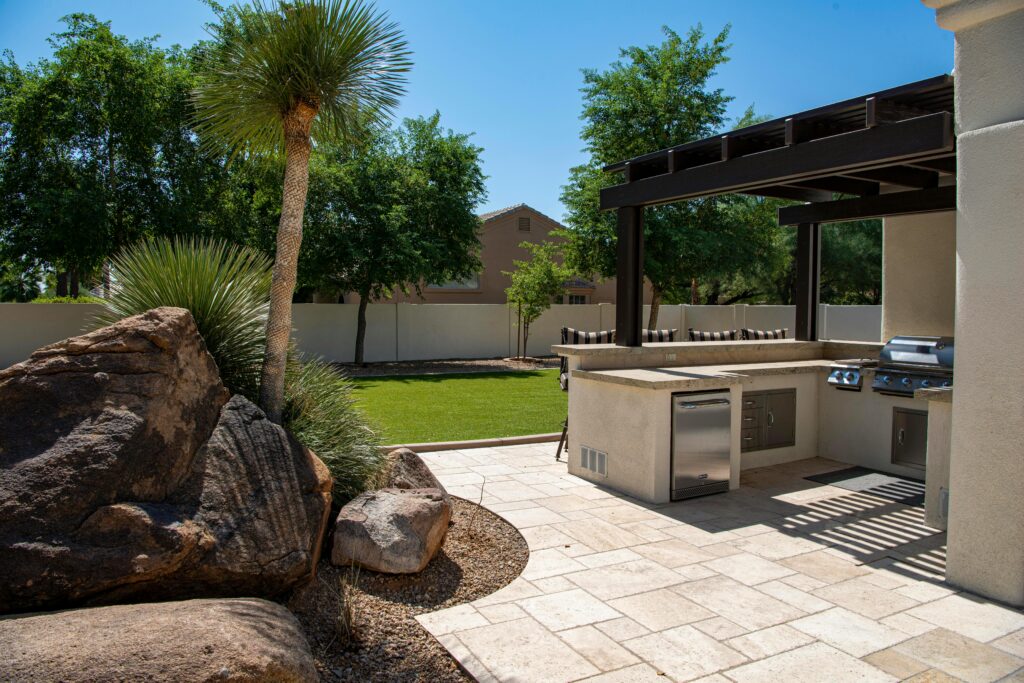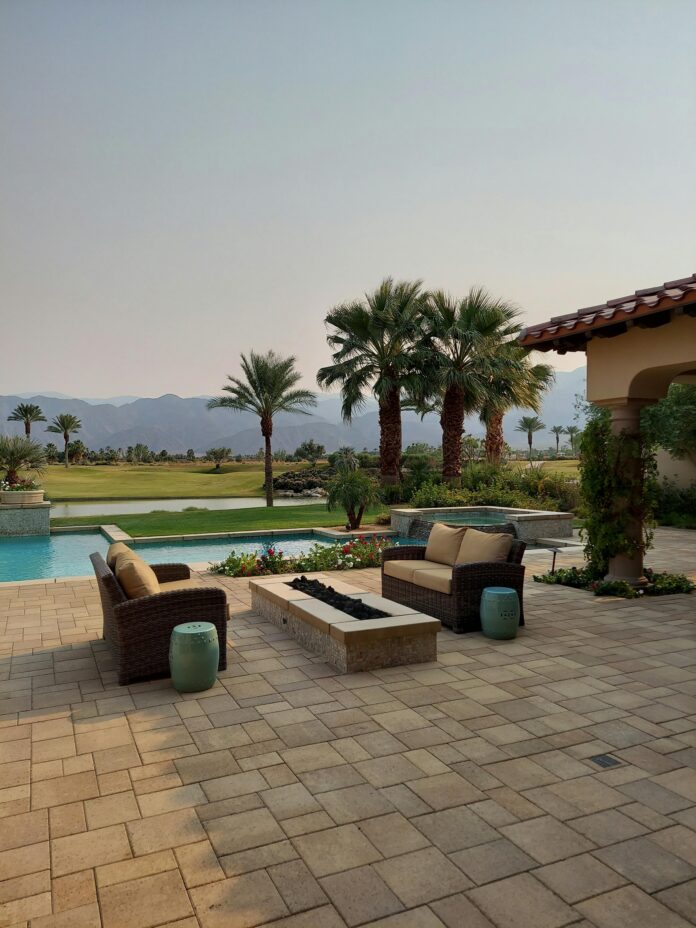Introduction
Deciding between patio pavers vs. natural stone can be challenging when designing a beautiful, durable outdoor area. Both materials offer unique benefits and aesthetics, making it essential to evaluate which is the best patio material for your space. Whether you’re aiming for the uniformity of pavers or the organic beauty of natural stone, this guide breaks down everything you need to know about stone patio vs. pavers—from cost and durability to installation and maintenance—so you can make the best choice for your patio.
Patio Pavers vs. Natural Stone: Key Differences and Benefits

Choosing between patio pavers vs. natural stone can significantly impact the look, feel, and durability of your outdoor space. Each option has unique characteristics that make it ideal for different styles and preferences:
1. Aesthetic Appeal and Design Options
When it comes to aesthetics, both patio pavers and natural stone can enhance the look of your outdoor space, but each offers a distinct style.
- Patio Pavers: Pavers come in a wide variety of shapes, sizes, colors, and patterns, making them highly versatile for design. You can opt for classic brick pavers, modern concrete styles, or even pavers that mimic the look of natural stone. This versatility allows you to create unique designs, like herringbone or basketweave patterns, that can give your patio a custom feel.
- Natural Stone: Natural stone offers a one-of-a-kind look, as each stone is unique in color, texture, and shape. Materials like flagstone, slate, and bluestone provide a natural and earthy aesthetic that complements landscaping and greenery beautifully. Natural stone has an organic charm and an uneven surface, adding a rustic, timeless appeal to any outdoor space.
Verdict:
If you want a polished and uniform look with design flexibility, patio pavers are a great choice. For a more natural, rustic vibe, natural stone is ideal.
2. Durability and Longevity
Both patio pavers and natural stone are durable options, but they differ in how they handle wear, weather, and longevity.
- Patio Pavers: High-quality pavers, especially those made from concrete or brick, are designed to withstand heavy foot traffic and harsh weather conditions. Pavers are highly durable and resistant to cracking or chipping, and if one piece does get damaged, it can easily be replaced without disturbing the entire patio.
- Natural Stone: Natural stone is highly durable and can last for decades when properly installed and maintained. However, its durability can vary based on the type of stone. For example, granite is incredibly tough, while softer stones like limestone are more prone to wear and can be susceptible to weathering over time. Natural stone is also highly resistant to fading, which makes it an excellent choice for areas with intense sunlight.
Verdict:
Both options offer durability, but natural stone has the edge in longevity. However, pavers are more practical for areas with heavy foot traffic where replacement might be needed.
3. Installation Process
The installation process can vary significantly between patio pavers and natural stone, impacting the cost and timeline of your project.
- Patio Pavers: Pavers are relatively straightforward to install and are designed to interlock, making the process simpler. They can be laid directly on a prepared base with sand or gravel, and the uniform shape allows for precise placement and easy leveling. The installation process is generally faster and requires fewer specialized skills, which can reduce labor costs.
- Natural Stone: Installing natural stone is more labor-intensive because each piece needs to be placed individually, which requires time and skill to achieve a balanced and level surface. Stones are often of varying sizes and thicknesses, which can complicate the installation process. Additionally, natural stone is heavier, making it more challenging to handle. This complexity can increase both the time and cost of installation.
4. Maintenance Requirements
Maintenance is an important factor to consider when choosing between patio pavers and natural stone, especially if you want to keep your outdoor space looking its best with minimal effort.
- Patio Pavers: Pavers are generally low-maintenance and only require occasional sweeping and washing to remove dirt and debris. They may need re-sanding or re-sealing every few years to maintain stability and prevent weed growth between the joints. Stains can be removed with specialized cleaners, and in the event of significant damage, individual pavers can be easily replaced.
- Natural Stone: Natural stone requires similar maintenance to pavers, with occasional cleaning to prevent the buildup of dirt and moss. However, natural stone may require sealing, especially if it’s a softer stone or if it’s exposed to moisture, to protect it from staining and water damage. Some natural stones, like slate, can develop a patina over time, which many people find attractive, while others prefer to seal it to maintain its original color.
5. Cost Comparison
Budget is often a major consideration in choosing between patio pavers and natural stone, as costs can vary based on the material and installation.
- Patio Pavers: Pavers are usually more affordable than natural stone, especially if you choose concrete or brick options. The cost of pavers can range widely, depending on the style and quality, but they’re generally less expensive than natural stone. Additionally, pavers’ simpler installation process often results in lower labor costs.
- Natural Stone: Natural stone tends to be more expensive due to its unique appearance and the labor-intensive installation process. The price can vary based on the type of stone; for example, limestone is more affordable, while granite or bluestone can be quite costly. Natural stone installation requires skilled labor, which increases the overall cost of the project.
Conclusion
Both patio pavers and natural stone are excellent options for creating a beautiful and functional outdoor space, but each has unique advantages. Patio pavers provide flexibility in design, affordability, and easy maintenance, making them ideal for those who value versatility and budget-friendly options. On the other hand, natural stone offers an unmatched natural beauty, durability, and a timeless look that appeals to those willing to invest in quality and uniqueness.














